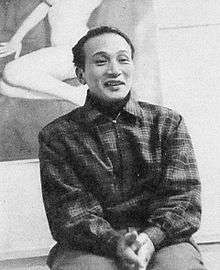Shichirō Fukazawa
Shichirō Fukazawa (深沢 七郎, Fukazawa Shichirō, January 29, 1914 – August 18, 1987) was a Japanese author and guitarist.
Shichirō Fukazawa | |
|---|---|
 | |
| Born | January 29, 1914 Isawa, Japan |
| Died | August 18, 1987 (aged 73) Japan |
| Occupation | Author |
| Genre | Fiction |
Biography
Fukazawa was born in Isawa, Yamanashi, Japan.[1] His first novel, The Ballad of Narayama (楢山節考, Narayama bushikō), won the Chūōkōron Prize,[2] and was twice made into a movie script: first by Keisuke Kinoshita in 1958,[3] and again by Shōhei Imamura in 1983.[4] Imamura's film won the Cannes Film Festival Palme d'Or.[5]
Shimanaka Incident
In 1960, the literary magazine Chūōkōron published his satire Furyū mutan (風流夢譚,“The Story of a Dream of Courtly Elegance"). In it the narrator dreams that leftists take over the Imperial Palace and behead Crown Prince Akihito and Princess Michiko before an enthusiastic crowd. This story provoked fury in the Imperial Household Agency and among Japanese ultra-nationalists.[6]
On February 1, 1961, in response to the story, Kazutaka Komori, a seventeen-year-old rightist, broke into the home of Shimanaka Hoji, Chūōkōron's president, killed his maid with a sword and severely wounded his wife.[7] Fukazawa went into hiding[6] and was little seen in public afterwards.
The aftermath of the Shimanaka incident (嶋中事件, Shimanaka jiken) meant that criticism of the Imperial Family, and discussion of the role or existence of the Emperor, became taboo.[8]
Selected prizes
- 1956 Chūōkōron Prize for The Ballad of Narayama (Narayamabushi ko)[1][2]
- 1981 Tanizaki Prize for Michinoku no ningyotachi (みちのくの人形たち)[1]
Selected works
- Narayamabushi ko, 楢山節考, 1956.
- Tōhoku no Zunmu-tachi, 東北の神武たち, 1957.
- 笛吹川, 1958.
- 言わなければよかったのに日記, 1958.
- 東京のプリンスたち, 1959.
- 千秋楽, 1964.
- 甲州子守唄, 1964.
- 人間滅亡の唄, 1966.
- 庶民烈伝, 1970.
- 盆栽老人とその周辺, 1973.
- 無妙記, 1975.
- 妖木犬山椒, 1975.
- Michinoku no ningyotachi (みちのくの人形たち), 1979.
- Chotto ippuku meido no michikusa (ちょっと 一服 冥土 の 道草), Tōkyō : Bungei Shunjū, 1983.
- 極楽まくらおとし図, 1984.
Records
- Sobo no mukashigatari (Nippon Columbia 1973)
References
- 深沢七郎/著 (in Japanese). Shinchosha. 2001-10-05. Retrieved 2009-01-28.
- 深沢七郎: 『楢山節考』 (in Japanese). ISIS. 2001-10-05. Retrieved 2009-01-28.
- Erickson, Hal. "The Ballad of Narayama". All Movie Guide. Retrieved 2009-01-28.
- Mannikka, Eleanor. "The Ballad of Narayama". All Movie Guide. Retrieved 2009-01-28.
- Mannikka, Eleanor. "The Ballad of Narayama: Awards". All Movie Guide. Retrieved 2009-01-28.
- "Jap Novelist's Dream Account Raises Furor". Charleston Daily Mail. Charleston, West Virginia: The Daily Gazette Company. Associated Press. 1960-12-01. p. 6.
The imperial household agency reacted angrily. There was talk of civil court action... An ultranationalist group in Tokyo, the "Greater Japan Patriotic Party," demanded the magazine issue an apology for printing the story.... Fukazawa... was reported hiding from possible physical attack from rightists.
- Treat, John Whittier; 1994 (January 1994). "Beheaded Emperors and the Absent Figure in Contemporary Japanese Literature". PMLA. Modern Language Association. 109 (1): 100–115. doi:10.2307/463014. JSTOR 463014.CS1 maint: numeric names: authors list (link)
- Japanfocus.org